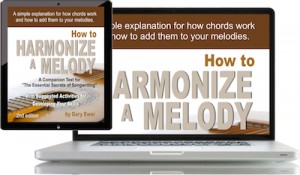There are times when songs form themselves in your creative mind rather quickly. It seems that almost within minutes, you’ve got the basic structure working, even if some of the lyrics, melodies and chords haven’t all been worked out. It’s exciting when things happen quickly in the composing of music.
On the other hand, a song can take a long time — weeks or longer. That’s not because of any particular creative problem; that’s just how it is sometimes. In general, songs that take a long time isn’t an indication of any kind of problem. As I say, sometimes that’s just how it is.
 Do you simply need some chords to get you started? “Essential Chord Progressions“, and “More Essential Chord Progressions” are part of “The Essential Secrets of Songwriting” eBook Bundle packages. Hundreds of chords to use as is, or modify to better suit your songs. Get today’s Deluxe Bundle Deal
Do you simply need some chords to get you started? “Essential Chord Progressions“, and “More Essential Chord Progressions” are part of “The Essential Secrets of Songwriting” eBook Bundle packages. Hundreds of chords to use as is, or modify to better suit your songs. Get today’s Deluxe Bundle Deal
But what about those times when your mind has created many different musical fragments, but you can’t seem to pull those ideas together to make a complete song? You’re not even sure if all the ideas that are rolling around in your creative mind all belong to the same song!
So what can you do with all of these ideas? Are they a song in the making? And if they are, what do you do with all of these ideas to create a viable song?
Here are some ideas for taking fragments of musical ideas, and seeing if there’s more there:
 If you’ve got bits of lyric rolling about in your mind:
If you’ve got bits of lyric rolling about in your mind:
- Write down any catchy lines of lyric, words and/or word combinations you’re thinking of. Get them all into your computer, even if they don’t seem connected.
- Reorganize these words so that similar or related ones are near each other on the page. Read them over and over.
- Fill in missing thoughts between the words you’ve written down. Is there a narrative here? Does reorganizing them in this way help reveal a story or situation?
- Create a preliminary lyric that focusses on the story you’ve been revealing.
 If you’ve got bits of melody that you’ve been singing to yourself:
If you’ve got bits of melody that you’ve been singing to yourself:
- Record yourself singing or humming any bits that your imagination has been playing around with.
- Any bits you’re singing will work better as a chorus melody if you instinctively sing them high in pitch. Verse melodies tend to be lower, so use your instincts and try to figure out where each melodic idea belongs.
- Improvise some chord progressions that support your melodic ideas. How much of whatever you’re imagining can be pulled together to form a verse-chorus section?
 If you’ve got a chord progression that won’t let go:
If you’ve got a chord progression that won’t let go:
- Play the progression through on your guitar or keyboard, and try different voicings, higher and lower.
- Concentrate on changing the upper note of the chord progression each time you voice it differently, and see if you can coax a melody to appear. Each time you change that upper note, you’ll find new melodic ideas will occur to you.
- Change the tempo, the backing rhythms, the key, even the time signature, and try a new melodic idea each time you do. Improvisation is the most important part, and you’lll generate something quicker if you change your starting note each time.
The idea here is to find the element that pulls everything together. Keep in mind that though you might feel that the many ideas in your mind are unrelated, most of the time your imagination is actually trying to make sense of it all.
And in that regard, sometimes all it takes is to get it all down on paper, or recorded on your computer, and you’ll finally start to see the relationships between them. And that’s the start of what can eventually (finally) be a successful song.
 Written by Gary Ewer. Follow Gary on Twitter
Written by Gary Ewer. Follow Gary on Twitter
 “How to Harmonize a Melody” shows you, step by step, how to choose the chords that will work with your melody, how to substitute chords, and how to make more complex progressions work for you. Buy it separately, or as part of “The Essential Secrets of Songwriting” 10-eBook Bundle.
“How to Harmonize a Melody” shows you, step by step, how to choose the chords that will work with your melody, how to substitute chords, and how to make more complex progressions work for you. Buy it separately, or as part of “The Essential Secrets of Songwriting” 10-eBook Bundle.











I know what you’re saying about capturing ideas. Sometimes I wake up with a melody in my head or even lyrics or a chord pattern. Then it’s a matter of getting it down quickly in some form before you lose it because dreams, especially, don’t generally transfer into long-term memory. That’s why you remember your dream vividly for a few moments, then often forget it altogether unless you’ve really contemplated it.
For the past ten years or so, I’ve found it very helpful to use either a tablet computer (now sometimes called 2-1) or else a tablet. I can record audio of myself at the piano or guitar quickly if I need to. Or if it’s the middle of the night, I can type in lyrics or go into a graphics program and crudely but quickly enter some music notation, all without waking up my wife.
I really enjoy your columns and insights. I try to show people musical things, too. I have a completely free, no advertising, no in-app purchases, no nothing, game called Play Along Keys on IOS and a lesser version on Android to give everybody a feel of performing a bit of music even if they are completely amateur. Unlike Guitar Hero, if you do well in the game, you can make the same motions on a piano and play the melody of a song. I do it because I find music promotes communication and understanding, even between people belonging to different cultures jamming together. The world especially needs this today. I also volunteer teach and like young people to feel enabled, whether on musical instruments or computers. So I do a lot of programming, record cover performances for the game, and pay a bit for servers and a simple ASCAP Play Music license. I hope it’s worthwhile for people. I also put up some indie music from some of my friends.
Best, Bruce https://playalongkeys.com